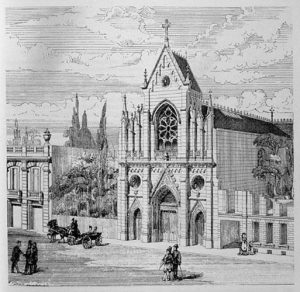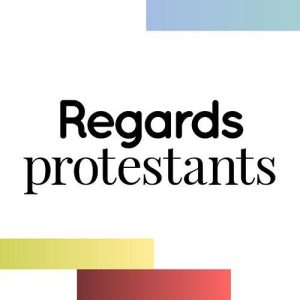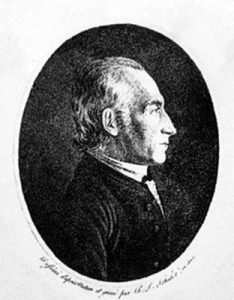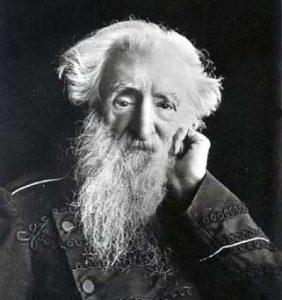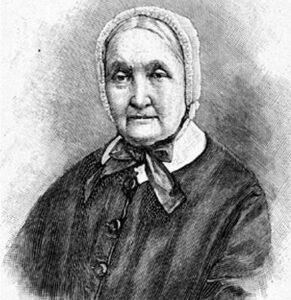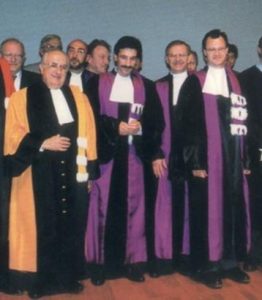The beginning of the Church of the Etoile
In 1866, Pastor Eugène Bersier (1831-1889), whose ancestors were Huguenot refugees in Switzerland, led a mission in the west of Paris. He organized evangelization meetings in a modest-sized hall which he rented in Neuilly and then he had a larger hall adapted to his needs in the Avenue de la Grande Armée; this was the Etoile Chapel, inaugurated on the 18th of September 1869. But in the same year, the hall proved to be too small, the first Council of the Etoile decided to have a church built on the plot of land on the avenue, opposite the chapel.
Building work soon started and the church as we know it today was inaugurated on the 24th of November 1874.
The Technical School of the Etoile
Unable to finance the project of a technical school for young women, the church council agreed that M.Nathaniel Johnston, a parishioner of the Etoile, buy a plot of land at the corner of two streets: number 52 Avenue de la Grande Armée on one side and Rue Denis Poisson on the other in order to erect a building which would be used for this school and in memory of his wife who had died in 1876. The school received its first pupils in 1877. The property, which consisted of a single floor building and a small garden, was handed over to the public limited company of the Protestant Church of the Étoile.
Due to the 1905 law which separated Church and State, the ‘Société de l’ Église de l’Étoile’ (the Etoile Church Corporation) could not add this property to the estate of the ‘Association Cultuelle’, (Religious Association) although this had been possible for the temple. So on the 22nd of June 1906 the ‘Association de l’École Professionnelle de l’Etoile’ (Association of the Technical School of the Etoile) was set up – this enabled the Etoile parish to become owners of the plot of land and the school building.
The estate corporation in the Rue de Corneilles which was founded in 1910 by the Friends of the Etoile already owned a block of flats which housed the Young Men’s Hostel and the charity organizations of the Petite Etoile at number 81 Rue Anatole France in Levallois Perret. It increased its capital, took out several loans and had an 8 – floor block of flats built on the entire plot of land in 1925. As they did not inhabit this new building at first it was possible to pay back the loan.
The technical school and restaurant were destined to give assistance to the inhabitants of the west of Paris
The aim of the ‘Association of the Etoile’ technical school was to provide a support network, formerly set up by Pastor Bersier especially for the management of the technical school for young women; they had come to Paris to look for work and x trained to be secretaries, telephone receptionists etc. All this came to an end when the first building was demolished in 1925.
The ‘Association of the Etoile’ technical school intended to continue its work of social assistance in the area so it decided to set up a restaurant entirely staffed by women in the new building. It sought advice in this enterprise from the Working Women’s Hostel, who undertook the construction work according to the convention of the 18th of March 1928.
This association had been founded on the 15th of March 1893 and was recognized as a charity promoting public interest on the 11th of January 1921 – it already owned several other hostels in Paris. The ‘Association de l’Etoile’ technical school handed over to them, as sub-tenants, one floor for the restaurant and part of the cellar of the building for the kitchens – it also lent them the money necessary for doing up the premises.
The restaurant could seat 250 people, placed at tables of four – it could serve 500 meals at midday and 100 in the evenings. The Working Women’s Hotel rented part of the third floor to set up a centre which enabled the young women to benefit from a library, a music centre; a leisure hall and various classes.
Little by little each Working Women’s Hostel shut down for financial reasons, leaving the Etoile hostel as the only survivor.
The decree of the 20th of November 1972 changed the name of the Working Women’s Hostel to the Etoile Welcome Centre, which was also recognized as a charity promoting public interest. This association ran a very reasonably priced restaurant and a centre with a café “which enables workers and anyone else to benefit from all the cultural, moral and financial advantages which they miss out on because they are far from home or for any other reason.”
In April 1986 it was decided to shut down the restaurant which no longer corresponded to its initial purpose as it was mainly used by taxi drivers. However, the decision to close down the association for social assistance run by the hostel was only made on the 3rd of April 1990.
The foundation of the Protestant Audiovisual Association Meromedia
On the 31st of December 1983, the building was owned once more by the ‘Association de l’Etoile’ professional school. Due to its bad condition much building work was necessary and the rent was not very high. At last, after a period of five years, the refurbishment was completed and it was possible to put up the rent – it was now possible to undertake a social assistance project. Its president, Maurice Gontier, contacted the administration of the Eglise Réformée de France, whose president, Jacques Stewart, was very keen on the following idea: to use the income from the rent of the building in order to develop audio visual equipment which could be used for catechism by isolated parishes who did not have a pastor.
The association decided to take on the name Meromedia with a motto ‘I communicate in order to unite’. It distributed nearly a hundred video recorders to remote parishes in order to use videocassettes for teaching purposes. At first the association made copies of a certain number of programs made by Presence Protestante (a Protestant television program) and a collection of videos was made which were distributed to remote parishes chosen by the Eglise Réformée de France; later on it included religious videos which had been made commercially.
It very soon became clear to Meromedia that there were not enough videos for the demands of x catechism purposes. As a result, Meromedia decided to make videos themselves as they were unobtainable commercially. They were made with the collaboration of many volunteers, pastors, teachers of catechism and historians.
Cassettes for children also contained a booklet giving advice as to how to use the videos when teaching catechism. Little by little the Catholics also discovered these cassettes and ended up by ordering a great many of them.
Since 1988, 2 or 3 cassettes were made every year, but DVDs and CD-Roms replaced the videos. In 2011 the catalogue contained more than 80 documents about the Bible, the history of Protestantism, portraits of Protestants and musical extracts; these were both made by Meromedia themselves and by others as well. However, sales went down regularly and profits as well.
The Foundation works together with the Institut Protestant de Théologie
The Foundation, undertakes to finance the studies of about 20 theology students, because formerly the Eglise Réformée de France did not give any financial aid to first year students, although it does now. The Foundation now gives financial help to about 10 students who are mainly foreign and also accommodation to 4 students. These scholarships are given to students in the Institut Protestant de Théologie (Paris and Montpellier) but also to the universities of Strasbourg and Aix-en-Provence.
The Foundation supports other Protestant associations
The Foundation also gives financial support to projects which have nothing to do with property. For example, the radio Fréquence Protestante can be found in the basement of their building – it also helps to finance the weekly paper Réforme, l’Alliance Biblique pour Ze Bible, L’Entraide Pastorale (Pastoral Mutual Assistance) and le Châtelet, a retirement home.
Provisions of capital received by the Foundation
The Foundation has also received other provisions of capital in addition to the office building in Rue Denis Poisson (which is one of its main sources of revenue).
On the 10th of April 1991 the council of the Foundation accepted a gift from the Association des Amis de la Petite Etoile (Association of the Friends of the Petite Etoile): this was the building formerly used by the hostel for young working people at no 81 Rue Anatole France in Levallois-Perret (act dated 18th of April 1991) – this used to belong to the Société immobilière de la Rue des Corneilles (estate company of the Rue des Corneilles).
In 1992, the Foundation also received a property in Boissy-Saint-Leger which housed the Cours Bernard Palissy (a gift from Baron Hottinger in 1827).It was given by the Society for the Encouragement of Primary Education among French Protestants, an association founded in the reign of Charles X and recognized as a charity promoting public interest in 1829.
In 1993 a new foundation was added to the others: the Foundation Marc Boegner, a Swiss foundation which used to distribute prizes for books about Pastor Marc Boegner in the past.
The Virtual Museum of Protestantism
This museum was set up with the financial support of the Société de l’Histoire du Protestantisme Français (Society for the History of French Protestantism) in January 2003 and aims at teaching, giving information and providing visual documents; it has the following program :
– To explain to the general public what it means to be Protestant
– To give details about key events in the history of French Protestantism, from the XVIth century up until the present day
– To keep a collection of pictures, texts, paintings, drawings and objects associated with Protestant history
– To guide those who would like to understand and learn more about French Protestantism so they can find what they are looking for.
Most pictures come from the Société de l’Histoire du Protestantisme Français (Society for the History of French Protestantism). The texts are written by an editorial committee of the Museum or sometimes by other authors. Access to the museum site is free and texts are written in French, English and German. In 2010 the museum contained more than 1000 texts and 3000 pictures – more than 1500 people on average, visit this site every day.
Regards Protestants, the Protestant Media Portal
The project for the internet portal for French-speaking Protestant Media was conceived at the beginning of 2012 and went into action in January 2013.
Regards Protestants gathers together the contents of all the Protestant newspapers, radios and video programs which have an internet site. Many French and Swiss media participate in this project:
– Newspapers or internet sites: (see original text)
– Radios: (see original text)
– T V programs: (see original text)
– Blogs (see original text)
– Associations such as Alliance Biblique (see original text).
Regards Protestants are able to highlight news in the Protestant media with exceptional clarity so as to attract the maximum of visits: 8 sections guide your research (Society, Protestant Life, the World, Well-being, Culture, Faith, the Bible and Theology). Every text gives full details about the original document from which it has been taken and encourages the internet user to discover this in full. There is also a descriptive file about every media participating in the project.
In addition, it is possible to consult articles of practical interest provided by other internet users: a calendar of events and a localization tool for finding particular events and temples.
As well as being a traditional internet site, Regards Protestants also includes all the latest devices of digital technology. One could say that it is truly multimedia in character, containing texts, audio and visual documents. It is in permanent contact with the latest social networks such as Facebook, Twitter, You Tube etc. and you can access it on tablets, mobile phones and by special phone applications.
The Pastor
Eugène Bersier Foundation
Fondation pasteur Eugène Bersier - 1 rue Denis Poisson - 75017 Paris


